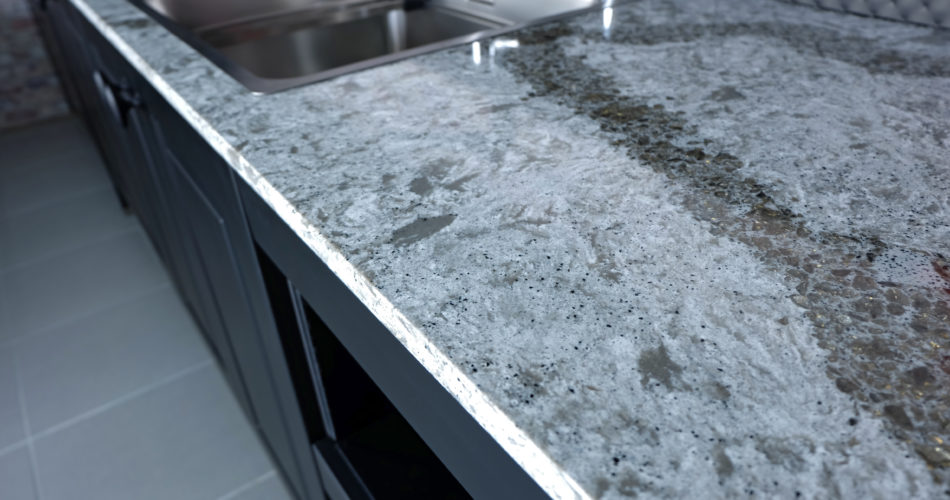One of the most popular types of kitchen countertop these days is quartz. It’s not hard to see why. A quartz countertop really is a thing of beauty. However, there are several myths and misconceptions that exist around the use of quartz in the kitchen. One of the most frequently asked questions is definitely: Are my cabinets strong enough for quartz? So, without further ado, let’s get straight down to the business in hand. Will conventional cabinets withstand the weight of quartz worktops, and what are some of the other key concerns that people have about quartz worktops?
Are my cabinets strong enough? Almost certainly, yes.
Generally speaking, unless your kitchen units are very old, it is highly unlikely that they will be too weak to handle the weight of any solid stone worktops, including quartz. Going back a couple of decades, it wasn’t uncommon to find certain problems associated with the strength of kitchen units. For example, sometimes there would be a lack of necessary support to the back of units as all the strength had been placed to the front.
The thing is, you are very unlikely to only be replacing the worktop if the units themselves are 15-20 years old themselves. This means, in reality, that the question of whether your cabinets are strong enough is never really likely to be an issue. Chances are, you’ll be replacing the units at the same time.
Units need to support the weight of the worktops
In fact, the most pressing problem you are likely to face is not about the strength of the kitchen units. The most important thing is whether the units will be supportive enough. Essentially, this means that there needs to be enough points of contact. This is because the larger the slab of quartz is, the more chance there is for stresses to occur – or even for failure. The crucial thing is actually that the units are perfectly levelled so that stresses can be avoided.
Quartz worktops tend to be thinner than other worktops
Another reason why your cabinets are likely to be strong enough for quartz is the fact that quartz worktops are often thinner anyway. This is simply because they look better that way. An example of this would be the trend towards handleless designs. In recent years, this ultra-modern look has really caught on. The thing is though that conventional countertop thicknesses (typically 30mm or 40mm) can end looking quite heavy and unwieldy on such cabinets. A material such as quartz is the ideal alternative here. Firstly, it continues with the contemporary and cutting edge feel to the kitchen design.
Furthermore, quartz can be cut thinner because of its strength. Therefore a 20mm thickness for worktops with quartz can be just the job.
Are cabinets strong enough? Changes in kitchen cabinet styles
Another thing to consider is the impact of changes to modern kitchen unit styles. For example, the trend for longer unit sections creates the possibility of weakness. Similarly, a cutaway at the top of a unit is needed to allow you to open a handleless door. This space is often filled with a trim constructed from aluminium. Aesthetically, this can look absolutely fantastic. The problem is that it provides next to no real support. Furthermore, corner units are often utilised in modern kitchen designs. This is unsurprising. After all, it’s important more than ever with modern living to take advantage of every bit of space that you have in the kitchen. The potential problem is that corner units will naturally lack support.
However, when all is said and done, these issues really are just something to consider and be mindful of. They shouldn’t be seen as actual reasons for not choosing quartz worktops. The devil is in the detail of the planning of a kitchen design. However, if you are left with any areas where it’s possible that your cabinets will be under particular pressure from the weight of a quartz worktop, a simple type of backer board or plywood can be added below the countertop to provide more support.
The benefits of a quartz countertop
The reasons why quartz has become so popular are pretty clear to see. Obviously, it doesn’t come particularly cheap. But with the hefty price tag comes a real mark of true quality. And let’s get one thing straight. When something looks this good, you’ll be happy to pay for it! Quartz has come a long way too in recent years. The first quartz countertops appeared in the 1960s, predominantly in Italy. As an alternative to stone and preferable because of its strength, quartz was instantly a hit in the kitchen. However, it has to be said, these formative designs tended to be on the dull side and limited to cream or tan colourings.
As technology as advanced, quartz countertops have been lifted from straightforward to absolutely stunning. These days, quartz comes in a plethora of styles of colour, edging and finish. There really is a quartz worktop to suit all needs.
Quartz offers much more than great looks
When it comes to quartz, it’s always going to be the looks that steal the show. A genuine headturner, there are few – if any – sights to be found in the kitchen as impressive as a quartz worktop in all its glory. But quartz offers so much more than its great looks. Perhaps surprisingly, quartz is actually remarkably easy to maintain, clean and take care of. You see, unlike natural stone or marble (both of which can be tricky to look after), quartz can give you a similar astonishing appearance as marble or natural stone. The only thing is that quartz is nowhere near as high maintenance.
This is because the mix of ground quartz and polymer pigments and resins to be found in quartz combines to great effect. Firstly, it produces a slab that is incredibly strong. Secondly, either the earthy tones of natural stone, or that gorgeous marble swirl effect Is replicated too. What’s more, quartz is unrivalled in terms of its resistance to scratches and cracks. Moh’s Scale is a system devised in the early nineteenth century to measure the hardness of minerals. Quartz clocks in with a ‘7’ ranking. Marble, incidentally, ranks at only ‘3’.
Caring for your quartz worktop
As a non-porous material, quartz is very resistant to mold, mildew and general stains. This males cleaning straightforward. You can also have confidence that the quartz will remain free from bacteria and germs. Another bonus is that quartz is famously resistant to heat damage. In fact, quartz can even withstand temperatures as high as 400 degrees (Fahrenheit). However, this does come with a very important health warning. If you place a very hot pan straight from the oven onto a cold kitchen countertop, it can result in thermal shock. In the worst case scenario, this could discolour or even crack the quartz. Furthermore, no material can ever 100% stain-proof. Quartz resists staining more than most materials because liquid cannot penetrate its surface. However, it’s still important that you clean up any spills promptly so that the original colouring of the quartz is maintained.
If you have any questions about quartz countertops or you need any advice, please get in touch with the Kitchen Warehouse team. We’re always on hand to help.




